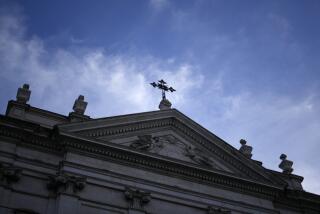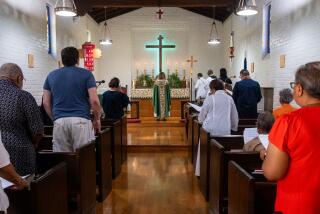Atheists in foxholes are entitled to their own chaplains
Years ago, desperate for a subject for a short “light and bright” editorial, I came across a news story about a telephone company that offered a “Dial-an-Atheist” service. The seeming absurdity of the idea appealed to me, and a punch line formed in my mind. I wrote:
“ ‘Dial-a-Prayer’ has met its match and Lloyd Thoren has met his reward. His reward is the title of ‘Atheist of the Year,’ bestowed upon him in honor of his answer to ‘Dial-a-Prayer.’ Mr. Thoren’s rural telephone company is the only one in America to offer a ‘Dial-an-Atheist’ line. The American Atheist convention, which honored Mr. Thoren, did not say what the caller hears when he dials ‘Dial-an-Atheist.’ Perhaps there is no answer.”
But the joke was on me. Increasingly, atheists are insisting that their message is not just a negative one, and are competing with theist religions for governmental recognition. When an interfaith service was organized to honor the victims of the Boston Marathon bombings, “non-theist” groups complained that not a single speaker reflected their beliefs. Unable to convince the Supreme Court that Ten Commandment monuments on government property are always unconstitutional, atheists are donating their own memorials to stand alongside the Decalogue.
And now there are calls for the U.S. military to appoint atheist chaplains, a proposal that the House of Representatives has tried to preempt with legislation requiring that chaplains be nominated by traditional “endorsing agencies” -- i.e., theistic religious organizations. The sponsor of the legislation, Rep. John Fleming (R-La.), said the idea of an atheist chaplain was “nonsensical -- it’s an oxymoron.” (The House Armed Services Committee defeated another amendment that would have allowed for the appointment as chaplains of “persons who are certified or ordained by non-theistic organizations and institutions, such as humanist, ethical culturalist, or atheist.”)
Notwithstanding the old saying, there are atheists in foxholes. But is Fleming right that it is nonsensical to think that they could be ministered to by atheist chaplains? This month, The Times’ David Zucchino wrote about Jason Heap, “a humanist who doesn’t believe in God” but who aspires to be a Navy chaplain.
Heap’s application comes with the support of the Humanist Society, but it’s not clear the Pentagon will recognize that group as a legitimate “endorsing agency.” Obviously, Heap, if he were accepted, wouldn’t be reassuring dying soldiers that they were on their way to heaven. But he might well be able to fortify them in their non-theistic beliefs about the meaning of self-sacrifice.
The truth is that religion isn’t interchangeable with belief in God. There are non-theistic Buddhists and faithful Unitarians who believe, as the joke goes, in “at most, one God.” (And some practitioners of Judaism and Catholicism find comfort in religious rituals even if they doubt the existence of God.)
It’s ironic that conservative such as Fleming would ridicule the notion of atheist chaplains because for decades conservatives have argued that “secular humanism” is a religion. If they’re right, why shouldn’t adherents be recognized by the chaplaincy program?
ALSO:
U.S., China and an unthinkable war
The Rim fire and the folly of sequestration
A report card for U.S. policy in the Mideast
More to Read
A cure for the common opinion
Get thought-provoking perspectives with our weekly newsletter.
You may occasionally receive promotional content from the Los Angeles Times.







